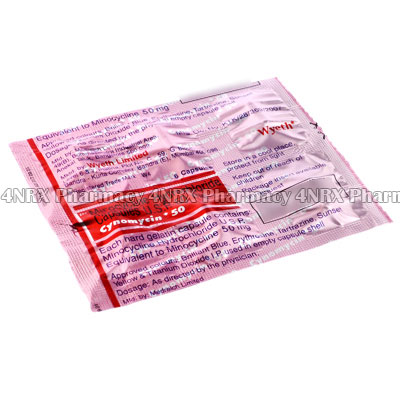 |
Home  Infection Infection  Cynomycin (Minocycline) Cynomycin (Minocycline) |
|
|||||||||
|
|
Cynomycin (Minocycline)
What is Cynomycin (Minocycline) used for? Cynomycin (Minocycline) is an oral tetracycline antibiotic prescribed to treat a wide variety of antibiotics. The medication slows or stops the reproduction of bacteria cells allowing the immune system to control or destroy the infection naturally. It is commonly prescribed to treat acne but may also be useful for treating infections affecting the soft tissues, urinary tract, respiratory tract, lungs, or skin. Your physician may prescribe it to treat other unlisted conditions, as well. How should I use Cynomycin (Minocycline)? Cynomycin (Minocycline) is normally taken twice each day at a dosage of one tablet, but your particular instructions will depend on the condition being treated, your current health, and the severity of your symptoms. These should be swallowed with a large glass of water and taken on an empty stomach. Do not stop taking the medicine prior to being told to do so as the infection may return stronger and more resistant to treatment. Never crush or split the tablets to avoid unintentionally destroying or altering the effects of their contents. Ask your pharmacist or physician any questions you have about using the medication to ensure the correct administration. What are the side effects of Cynomycin (Minocycline)? Some patients using Cynomycin (Minocycline) have reported experiencing side effects such as:
More serious side effects that may require emergency medical attention are severe headaches, chest pain, difficulty breathing, flu symptoms, sores appearing in or around the mouth, severe diarrhea, sensitive skin, easier bruising, joint pain, blurry vision, seizures, jaundice, or severe skin reactions. Tell your physician about any unusual symptoms that occur to make sure the correct alterations are made to your dosage or application frequency to prevent more complications from occurring. Please Note Do not begin using Cynomycin (Minocycline) if you are pregnant, breastfeeding, if the patient is a child under the age of twelve, if you have severe kidney failure, or porphyrias. Also inform your physician if you are taking medications that may affect the liver, have myasthenia gravis, systemic lupus, decreased liver function, or decreased kidney function. These conditions may cause unexpected problems during treatment requiring special alterations to your regimen. Strictly follow all instructions provided to you by your physician or pharmacist while using Cynomycin (Minocycline). Optimum and safe dosage can differ based on the patient and the condition being treated. As this medication may be unsafe for certain patients, it is essential you always inform your physician if you are pregnant or breastfeeding, as well as if you have any allergies, other illnesses, or ongoing health conditions, and if you are taking any other form of medication, supplements, or herbal products. Immediately seek emergency medical care if you have an allergic or hypersensitive reaction. Common signs of a reaction include hives, swelling, skin rashes, chest pains, as well as trouble breathing or swallowing. 
|
||||||||||||||||||||||